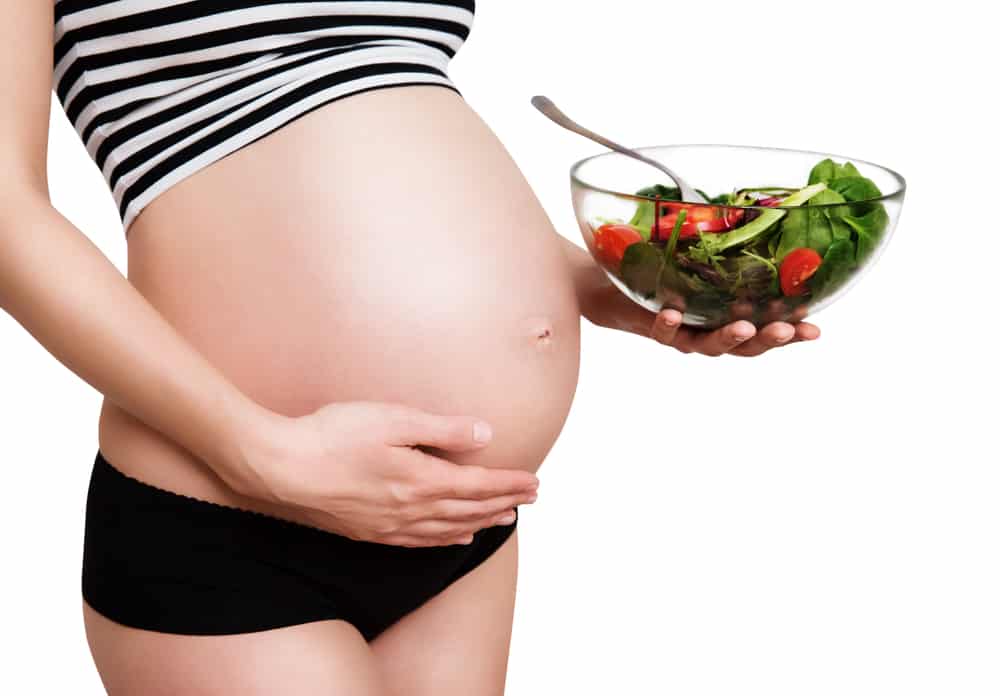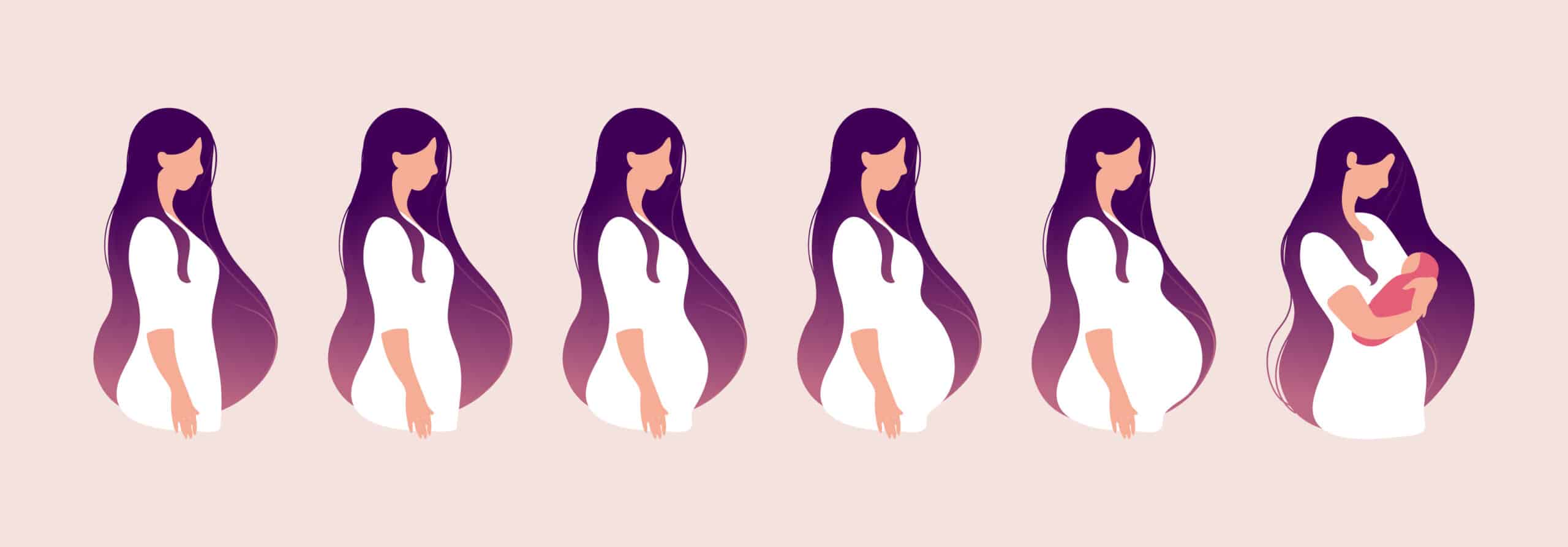Pregnant women need to make sure that they get enough folic acid during pregnancy. Folic acid is a type of vitamin B that is needed by both the mother and the growing baby. Folic acid plays an important role in regulating new cell production, especially red blood cells, within the mother.
It’s also an essential nutrient for the baby, as it is an important component in neural tube development. In short, it’s needed for healthy brain and spinal cord development. But don’t worry—the 500 mcg of folic acid that most pregnant women need each day is easy to reach through a diet containing fortified foods, leafy greens, eggs, or organ meats, as well as supplementation if needed.
How Much Folic Acid Do I Need During Pregnancy?

The amount of folic acid that you need during pregnancy will depend on whether any of the parents have any personal or family history of birth defects related to lack of folic acid. In most situations, the US National Institutes of Health (NIH) and Institute of Medicine (IOM) recommend pregnant women to get 600 mcg of folic acid during pregnancy and 500 mcg of folic acid during lactation.
If you or your partner has a family history of birth defects, however, you should take a higher dose of folic acid of 1,000 mcg a day. The same goes for if you have type I or type II diabetes, if you are taking medications that impact folic acid metabolism or if you have a condition that reduces your body’s ability to absorb folic acid, like Crohn’s or Celiac disease.
If you or your partner have a neural tube defect or have had a previous neural tube defect pregnancy, then you’ll want to up your folic acid dosage to 4,000 mcg a day. In these situations, you might not get enough folate from your diet, and should consider taking folic acid supplements.
The Difference Between Folate and Folic Acid
You’ll often hear the term “folate” and “folic acid” interchangeably. Folic acid is essentially a synthetic form of folate, which is a type of vitamin B. Folate is a general term for vitamin B9. In general, folic acid is the most ideal form for food fortification because it is heat-stable. In comparison, natural folate can break down when exposed to heat and light.
Factors that Cause Folic Acid Deficiency
Some women will need to consume more folic acid because their bodies are unable to absorb this vitamin properly. Some common causes of folate deficiency include:
- Achlorhydria or hypochlorhydria, which is either a lack of or low stomach acid
- Alcoholism
- Dialysis
- Diseases like Celiac disease or short bowel syndrome
- Genetic variations that affect the way that the body absorbs folate
- Hemolytic anemia
- Prescription drugs like methotrexate and sulfasalazine
- Surgeries that affect folate absorption like a gastric bypass
Most doctors will perform a full body checkup on pregnant mothers to see whether they have anything that could cause a folate deficiency.
For example, some people have a mutated folate metabolizing enzyme because of their genes. They have a lower enzyme activity and will not be able to make an enzyme that produces the biologically active form of folate. Even if they consume the recommended levels of folate, it won’t be enough. These genetic mutations and variations are more likely to affect certain ethnicities than others.
Pregnant mothers who struggle with a folate deficiency will usually be recommended to take folate supplements and to eat foods that are richer in folate. They may also want to get regular checkups to ensure that they are on the right page.
When Should I Start Taking Folic Acid During Pregnancy?

As folic acid is an important vitamin, every woman should make sure that they’re getting enough folic acid every day regardless of whether they plan on getting pregnant or not. Folic acid is needed to regulate many important bodily functions and is needed to make new cells.
With that said, your baby’s neural system will start to develop early on. Neural tube defects usually emerge in the first 4 weeks of pregnancy, so pregnant mothers should make sure that they get enough folic acid especially during the first trimester of pregnancy. They will, however, need to take folic acid throughout the entire length of their pregnancy.
If you’re planning on getting pregnant, most experts recommend taking folic acid supplements for at least a year before getting pregnant. Previous studies have shown that those who do will see a 70% reduction in spontaneous early term births between 20 to 28 weeks and a 50% reduction between 28 to 32 weeks.
Foods Rich in Folic Acid
Plenty of foods, like cereals, rice and orange juice, in the U.S. are fortified with folic acid. Check out the nutrition labels on the food items you purchase to see whether any folic acid is added. You can also find natural folate in the following food items:
- Asparagus, which contains about 134 mcg of folate in every 90-gram serving
- Bananas, which contain about 23.6 mcg of folate in every medium banana
- Beef liver, which contains about 212 mcg of folate in every 85-gram serving
- Beets, which contain about 148 mcg of folate in every 136-gram serving
- Eggs, which contain about 22 mcg of folate in every large egg
- Lentils, which contain about 131 mcg of folate in every 177-gram serving
- Spinach, which contains about 58.2 mcg in every 30-gram serving
Leafy greens contain a lot of folic acid, as well as other essential vitamins and minerals that are needed during pregnancy. If you want to make sure that you consume enough folic acid during pregnancy, add more leafy greens to your meals. You can eat more salads or even drink a healthy smoothie!
Folic Acid Supplements

Hormonal and physical changes during pregnancy can cause some pregnant women to have difficulties stomaching food. If you’re worried about whether you’re consuming enough foods that are rich in folic acid, consider taking folic acid supplements. These supplements often come in easy-to-take capsules.
Folic acid is a water-soluble vitamin, so it’s best to take these supplements on an empty stomach first thing in the morning. Try to take them approximately 30 minutes before or two hours after a meal.
Low Folic Acid During Pregnancy
The main problem with folic acid deficiency during pregnancy is that the baby will most likely develop neural tube defects. The two most common types of defects include anencephaly and spina bifida. These two defects are untreatable, and babies born with these defects will usually only survive for several hours after birth or be permanently disabled.
Anencephaly
Anencephaly is when the brain is not completely developed. When this happens, it’s usually when the mother does not get enough folic acid during the first trimester. Anencephaly happens when one end of the neural tube fails to close, and this usually happens at around 23 to 26 days after conception.
Babies that are born with anencephaly are usually blind, deaf and unaware of their surroundings. They usually are unable to feel pain as well. In most situations, babies with anencephaly do not survive for longer than a few hours after birth.
Spina Bifida
Spina bifida is when the spinal cord is not completely developed. Spina bifida can range from mild to severe. Depending on the size and the location of the neural tube defect, spina bifida can result in mobility issues or orthopedic complications. Some babies may even struggle with bowel and bladder problems, sleep disorders, skin problems and more.
It’s also not uncommon for babies to develop meningitis, Chiari malformation type II, shunt malfunctions and more. Signs and symptoms of these issues could include frequent headaches, vomiting, sleepiness, irritability, issues with breathing and swallowing and more. Some of the symptoms can be treated; however, others are permanent.
Benefits for the Baby
Folic acid intake is quite crucial for healthy development. It may also protect the baby from other possible health complications like:
- A cleft lip and palate. This is when the baby’s lip or mouth does not form properly and the lip does not close completely before birth. As a result, the baby will have an opening in the upper lip that looks like a slit. In some cases, this slit can go through the entire lip and reach the nose. Fortunately, a cleft lip and palate can be corrected by surgery.
- Low birth weight. Babies are considered to have a low birthweight if they weigh less than 5 pounds and 8 ounces. Although some babies with a low birthweight are relatively healthy, others may be afflicted by serious health problems.
- Most miscarriages usually happen early on in the pregnancy, and 80% of miscarriages will happen in the first 3 months.
- Poor growth in the womb. This could lead to further developmental issues in the future.
- Premature birth, which can lead to chronic issues, like infections, asthma and feeding problems. Studies show that premature infants also have an increased risk of sudden infant death syndrome (SIDS).
Pregnant women who monitor their folic acid intake can ensure that their babies develop and grow up properly. With that said, the complications listed above can also be caused by an insufficient intake of other vitamins and minerals.
Benefits for the Mother
Other than reducing pregnancy complications, folic acid is also essential to good health in general. It has been associated with a reduced risk of:
- Alzheimer’s disease
- Cardiac disease
- Diabetes
- Stroke
- Some types of cancer
Folic acid helps the body produce and maintain new cells. It’s also used to treat certain types of anemia caused by folic acid deficiencies. Some studies have shown that folic acid can treat depression, anxiety and stress.
Other studies have found that folic acid can help improve fertility in women, as it is essential in maintaining oocyte quality, implanting the fertilized oocyte and maturing the oocyte. This is why many experts recommend women who are trying to get pregnant add more folic acid to their diet.
Taking Too Much Folic Acid
Even though folic acid is such an important vitamin for development, you should be careful not to consume too much. Some studies have suggested that taking too much folic acid can be a problem, which is why some supplements have begun to lower the amount of folic acid that is added to their products.
There is a growing concern that too much folic acid during pregnancy can cause the babies to develop asthma. The studies, however, were performed on rats, so there isn’t any conclusive evidence that this would happen in human babies. Still, it’s important for pregnant mothers to be aware that chowing down on too many leafy greens may not always be best for their babies.
It’s important that “too much” can also be relative. It really depends on what the mother needs and whether they have any conditions that may cause them to not be able to absorb enough folate from their diet.
Get Enough Folic Acid During Pregnancy

Pregnant women need to be very careful with their diet during pregnancy. They need to make sure that they’re eating healthy foods and getting enough vitamins and minerals. Folic acid is one of the most important vitamins that pregnant women need to consume, as the consequences of insufficient intake can be devastating and incredibly harmful to the baby.
If you have any questions or if you’re concerned with whether you’re getting enough folic acid during pregnancy, consult with a healthcare professional.
